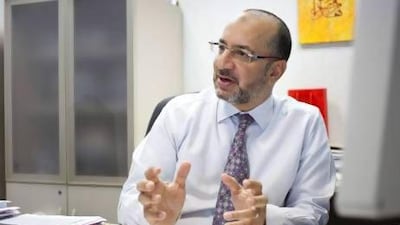Abdul Kadir Hussain is the chief executive of Mashreq Capital, the asset management arm of Mashreq that has US$930 million of assets under management.
The best-performing fixed income fund manage6r last year, his fund has delivered lower returns this year after a credit market sell-off sparked by indications the US Federal Reserve may start to scale back on stimulus measures in the coming months.
Nevertheless, Mr Hussain is still outperfoming other credit-focused fund managers in the UAE this year.
What asset class and geography are you focused on?
My background is in fixed income. We have funds managed out of three jurisdictions - DIFC, Bahrain and Ireland. Two thirds are fixed income, one third is equities. We do fixed income globally and in the region, equities is just Middle East.
How long have you been managing investments?
I've been doing this now for almost 20 years. I've been here for seven years, prior to that Credit Suisse in London and Singapore. I learnt to trade bonds in the US at an affiliate of Pimco. [Mashreq] didn't really have a fixed income business - it was a good opportunity to come in and set a lot of this up.
What is the outlook for the quarter ahead in your opinion?
Our view is the main source of volatility that we're concerned about for the year, which was interest rates, has played its course for this year. We should start stabilising at these levels. You've not had any new issuance for two months and you probably won't get anything in the next month as we finish Ramadan and get into August. Starting in September, with this new base level of rates established, we should see some new issuance coming to market again.
What are the main risks, either upside or downside, to the outlook?
The main factor over the near term is China, particularly for this region. We're very focused on the Purchasing Manager's Index numbers and generally the health of the Chinese economy because it impacts commodity prices.
What is the best investment at the moment in your opinion?
What we're looking to is less volatility relative to some other markets. Our view is that the equity side is more constructive - we think you can accumulate more gains there than in fixed income. Earnings growth in the US will support risk assets. For the region … the domestic demand story in this region has been a very strong focus on equities and the fixed income side. The amount of money spent on domestic investments and consumption we expect to continue. Saudi, in general, has been a relative laggard in terms of the equity markets, so we expect some good performance - particularly from Saudi banks.
What was the best investment you were ever involved in?
There have been a few - one general category has been in terms of distressed debt situations. We had a couple of companies in Asia during the Asian financial crisis where we got more than 300 per cent returns. We did our analysis and bought debt at very distressed levels knowing the company had the ability to repay or refinance when the market wasn't sure they could. That worked out and they had very strong returns. In this market, the strongest returns have been in the Dubai space - particularly in 2009 and 2010, when there were a lot of doubts as to how bondholders were going to get treated. You could buy any name at 50 or 60 cents on the dollar and you could ride that up all the way to par.
What was the worst?
A Russian dairy company six or seven years ago. That was a situation where the owners defrauded the company. … Luckily for us it wasn't a big size investment. But what I learnt from it was what I knew all along. Always follow your instinct … The bottom line is we're all investing in emerging markets and a lot of the legal frameworks and legal protections you might have in a well established jurisdiction in some cases don't exist.

